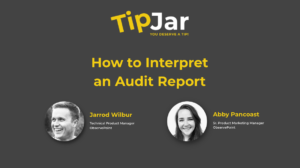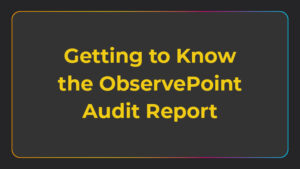Tag Governance: Your Best Martech Investment in 2019

The martech landscape is rapidly expanding, and this is just the beginning.
Companies are spending more and more on marketing technologies. According to a joint study by WARC and Moore Stephens:
“In the UK and North America alone, brands increased their martech budgets by 44% over the past year to $52bn. Nearly a quarter (23%) of their total marketing budget now goes on martech, up from 16% a year ago.”
As marketers continue stacking tech, they might consider taking a step back and asking themselves: “What are we doing to make sure these technologies are actually working how we expect them to?”
So, I ask you, what are you doing to ensure functionality of your martech?
Your Marketing Technology Hinges on Tags
Any marketing solution that collects data from your site (such as an analytics or advertising tool) requires you to add a snippet of code to each page of your site. That snippet is called a tag.
Each tag added to a website or app adds a new layer of complexity, which, if not governed, can result in harmful consequences, including (but not limited to):
- Lost data
- Bad decisions based on inaccurate data
- Lost ROI on marketing investments
- Data being sent to unauthorized parties
- Extra work for data end users
Ultimately, someone at your organization needs to be responsible for checking all tags are present, working and authorized. But with dozens of technologies on each site and what could be thousands (or even millions) of pages, manual governance of an entire site is a ludicrous suggestion.
That’s why tag governance solutions will be your best marketing investment of 2019. Tag governance solutions crawl your site on a set schedule, finding all instances of third- and first-party tags, and alert you to any broken, unauthorized or even missing technology.
How specifically can tag governance work for your data-driven teams? Below are some scenarios and stories of companies who adopted tag governance solutions and avoided potential data disasters.
Business Case #1: Identify Broken Tags and Prevent Data Loss
Ever fixed something you didn’t know was broken? Probably not. Such it is with analytics and other martech tags—if you don’t know a tag is broken, you can’t fix it.
Cue tag governance. Tag governance solutions scan your website for tags and alert you if anything is missing or broken.
One Fortune 500 office supply retailer received an automated alert when their shopping cart path didn’t pass the test. The scan revealed analytics tags had broken on 35% of their site and had completely fallen off the shopping cart path for Firefox browsers, preventing analytics data from being collected and causing a significant drop in metrics.
By using the tag governance solution, they were able to quickly resolve what could have been a very costly loss of data.
Business Case #2: Protect Against Bad Decisions Based on Bad Data
Consider this scenario: You just released a new version of your website that you’re tickled to death about. It has all the bells and whistles customers asked for, and you’re raring to see the results.
One month passes, and the results aren’t good. The site’s traffic metrics pale in comparison to the previous site’s. How’d that happen?
One company faced this exact problem. While testing two versions of their website, the firm’s analytics reports showed the old design outperformed the new, so they cut the new site. But the question still lingered: Was the old site really performing better?
After adopting a tag governance solution, a scan of their site revealed duplicate tags on the old site, inflating data 300-500%. Poor data had led marketers to cut the new, more successful site, resulting in lost time, money and confidence.
Business Case #3: Ensure ROI on Marketing Investments
For marketers, the idea of wasting ROI on martech spend is a cardinal sin. But without the appropriate safeguards (tag governance), that’s exactly the threat marketers face.
Take the wise example of one large software security provider auditing their clients’ websites. Soon after adopting a tag governance solution, one of the reports revealed the tags used to trigger retargeting ads were no longer firing and initiating the retargeting campaign. The firm was able to alert their client and get those tags replaced and their retargeting ads working again.
What financial impact did their discovery make? This retargeting campaign was accountable to bring in $500,000 of revenue per year, and by discovering that those retargeting tags weren’t firing correctly, the security software provider was able to have a huge win in saving retargeting ROI for their client.
Business Case #4: Prevent Data Being Sent to Unauthorized Parties
What would happen if an unauthorized party got a hold of your data? Maybe one of your agencies is sending your data places you don’t know about? Or maybe a previous employee still has access to an old analytics tool you forgot to uninstall?
These are real issues companies face—but they’re also 100% avoidable with the help of a tag governance solution.
Consider one of the world’s largest telecom companies who migrated to a new analytics solution and banned the use of their previous tool. To ensure all tags of the old vendor had been removed, the telecom used a tag governance solution to scan every sub-domain of every site.
The results? Of the 22 sites thoroughly analyzed, 6 still had Google Analytics present on their site. These 6 sites had an overall GA implementation of 26.56%, with some subdomains still at 95-100% GA implementation.
Without the governance solution, the company would have continued sending data to the unauthorized analytics tool, exposing potentially sensitive data to unauthorized users.
Business Case #5: Avoid Extra Work and Unnecessary Inefficiency
There’s a lot of complexity involved with deploying analytics and marketing tech to a website. It’s messy business. As a result, technology teams spend an inordinate amount of time spot-checking implementations page by page trying to find errors. This is time that could be spent doing what data was meant for: creating insights for better business decisions. Instead you’re paying your developers, QA engineers and analysts to be full-time tag debuggers.
Here are your options:
- Maintain the status quo and waste valuable human resources (not ideal)
- Stop debugging tags and try to make decisions off of bad data (let’s see where that gets you)
- Adopt a tag governance solution and get better data faster (Yes, yes, and yes)
One prominent pharmaceutical marketing agency chose the third option. By automating the process of testing their marketing and analytics implementation, the agency turned what used to be a 16-hour vetting process into something that now takes only minutes—resulting in as much as an 87.5% increase in employee efficiency.
Tag Governance Will Be Your Best Martech Investment
The data you collect on your website is one of your most valuable assets—it would be a shame to see that data get corrupted or misused due to lack of proper governance.
Tag governance solutions can quickly reveal the status of your tags—whether they’re fully operational or just barely hanging in there. If you can spot and resolve the molehills before they grow into mountains, your company will be all the better off for it.
At ObservePoint, we make it easy so you can get it right. We deliver confidence and save you time. Request a demo to see how a tag governance solution can work for you.





